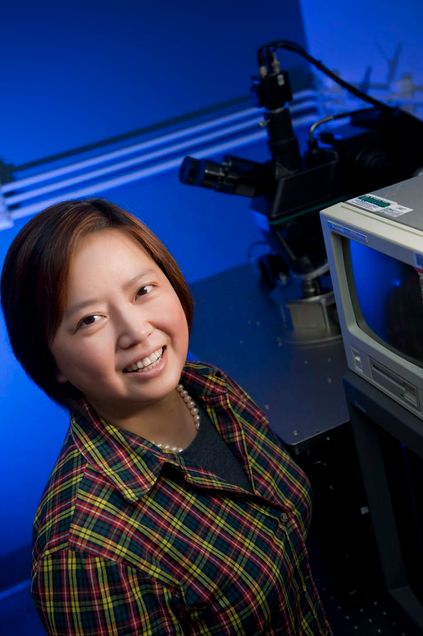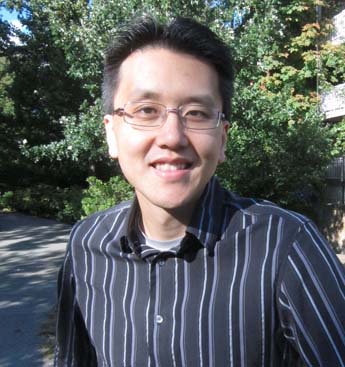Xin Zhang to Deliver DeLisi Lecture
By Liz Sheeley
To recognize their contributions to engineering and society, Professor Xin Zhang (ME, ECE, BME, MSE) is the recipient of this year’s Charles DeLisi Award and Lecture, and Assistant Professor Wilson Wong (BME) has received the Early Career Excellence Award.
The Charles DeLisi Award and Lecture recognizes faculty members with extraordinary records of well-cited scholarship, senior leaders in industry and extraordinary entrepreneurs who have invented and mentored transformative technologies that impact our quality of life, and provides the recipient with a public forum to discuss his or her work before the Boston University academic community and the general public.
Zhang will present the Charles DeLisi Distinguished Lecture, “Tailoring Electromagnetic and Acoustic Waves with MEMS and Metamaterials” on Thursday, April 12 at 4 p.m. in the Rajen Kilachand Center for Integrated Life Sciences & Engineering.

Xin Zhang has been a member of the BU Faculty since 2002, and is a professor of mechanical engineering, electrical & computer engineering, biomedical engineering, materials science & engineering, and the Photonics Center. She leads an interdisciplinary team of researchers focused on fundamental and applied aspects of microelectromechanical systems (MEMS and its descendent NEMS or micro/nanosystems). Her research group—the Laboratory for Microsystems Technology—seeks to understand and exploit interesting characteristics of physics, materials, mechanics, and manufacturing technologies with forward-looking engineering efforts and practical applications ranging from energy to health care to homeland security.
Zhang has published more than 140 papers in interdisciplinary journals. She served as associate chair for mechanical engineering graduate programs at BU from 2008 to 2011, and is now associate director of the BU Nanotechnology Innovation Center and director of both the National Science Foundation (NSF) Research Experience for Undergraduates and the NSF Research Experiences for Teachers Sites in Integrated Nanomanufacturing at BU.
She has received numerous awards for research and education excellence and was both a U.S. and E.U.-U.S. National Academy of Engineering Invitee. In 2009, she was named the inaugural Distinguished Faculty Fellow, an appointment given to tenured engineering faculty at Boston University who are on a clear trajectory toward an exemplary career in all dimensions of science and engineering. In 2016, she was selected as the recipient of the IEEE Sensors Council Technical Achievement Award (advanced career) for distinguished contributions to micro/nanoelectromechanical systems. She is a Fellow of AAAS, AIMBE, ASME, IEEE, and OSA, and an Associate Fellow of AIAA.
The Early Career Research Excellence Award celebrates the significant, recent, high-impact research achievements of exemplary tenure-track faculty who are within 10 years of receiving their PhD.

Assistant Professor Wilson Wong (BME) is the College of Engineering’s 2018 Early Career Excellence Award winner. A member of the BU faculty since 2012, Wong’s research is in the development of mammalian synthetic biology for cancer immunotherapy and other medical applications. In recognition of his innovative research, Wong received the National Institutes of Health (NIH) Director’s New Innovator Award 2013 and National Science Foundation Faculty Early Career Development Program (CAREER) Award in 2016. One of his recent papers from Nature Biotechnology has been recognized by multiple news outlets including WIRED and Science. That paper details a new method to make it easier for synthetic biologists to build new, complex genetic circuits that respond to environmental stimuli within a cell. Wong’s method – called Boolean logic and arithmetic through DNA excision (BLADE) – has many applications within scientific research. In addition to allowing synthetic biologists to build and test genetic circuits, BLADE can be used to engineer specific cell types to use in cancer and neurodegenerative disease research.
The Award’s namesake, Charles DeLisi, who is widely considered the father of the Human Genome Project, was an early pioneer in computational molecular biology, and also made seminal contributions to theoretical and mathematical immunology. He currently serves as Metcalf Professor of Science and Engineering, and continues to direct the Biomolecular Systems Laboratory, where more than 100 undergraduate, graduate and post-doctoral students have trained.
As Dean of the College of Engineering from 1990 to 2000, he recruited leading researchers in biomedical, manufacturing, aerospace and mechanical engineering, photonics and other engineering fields, establishing a research infrastructure that ultimately propelled the College into the top ranks of engineering graduate programs. In 1999 he founded—and then chaired for more than a decade—BU’s Bioinformatics Program, the first such program in the nation.